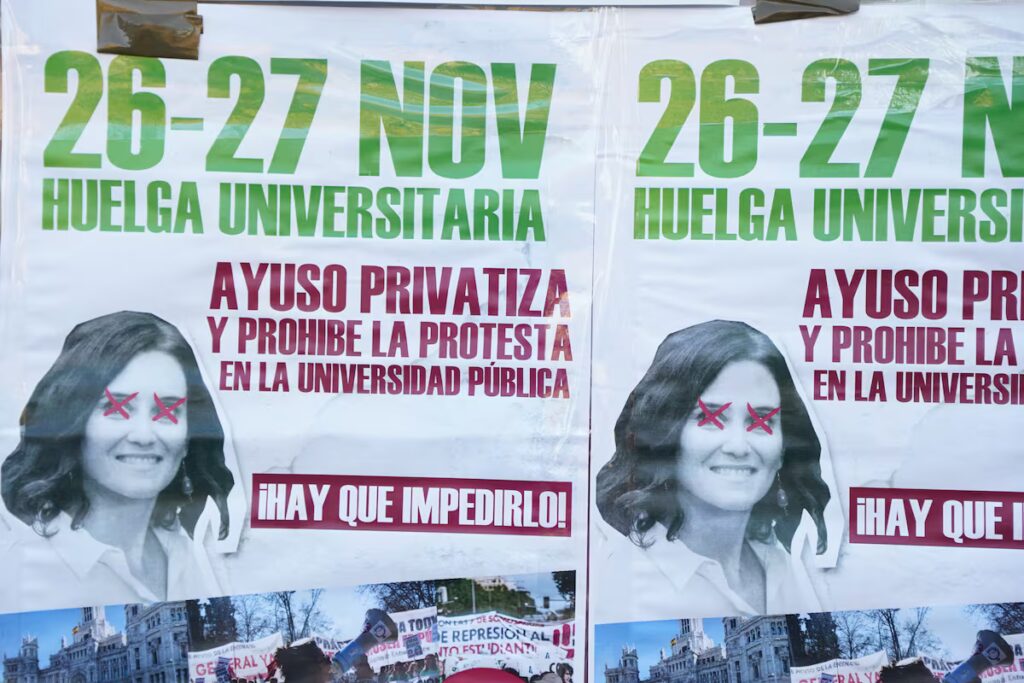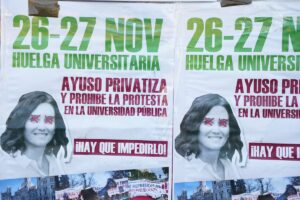
Today and tomorrow the public university community of Madrid (teaching and research staff, administration (PTGAS) and students) is called to strike in defense of the public university. A strike to stop its degradation after decades of underfunding and lack of institutional respect for the functioning of the public university and, therefore, it is a strike full of reasons.
An institutional degradation that is the basis of the law on higher education (Lesuc) that is in the project: the reduction of the institutional weight of the rectorate (compared to what is provided for by state law), the renewed role of the Social Council as a “parallel rectorate” (which does not respect the constitutional jurisprudence on university autonomy), the role of intervention or the attempt to eliminate the critical role of the university are, among others, data that reflect that we do not want a university that fulfills its role in society.
A degradation which, secondly, is cheap. From the Esperanza Aguirre cuts in 2008 (which the UCM initially resorted to on its own) until today, public funding has been reduced.
When there is no financing model nor have sufficient line items been included in budget transfers to mitigate inflation or wage increases in budget legislation, the result is painful. When you do not want to participate in the definition of the financing model of the Spanish State and want to do it “your way” and forget that financing is an obligation under the Royal Decree on the transfer of university powers, it becomes clear that 1% of Madrid’s GDP will be a chimera.
A degradation which, thirdly, affects the value of academic qualifications: the incessant increase in universities, centers annexed to public universities, and the tendency of foreign centers and other autonomous communities to enter without prior control, means that the academic qualification of the public university has less value.
And no, when quality requirements are asked, we do not want to attack the freedom of business. It is the tool for the system to be positive for the benefit of everyone. Perhaps the Madrid government should review the objective of the most important private university in the world, Harvard: quality of teaching and research and not the mere obtaining of economic results.
A degradation which, fourthly, affects research. In Spain, research is done mainly in public universities, I am referring to statistics. Investments in science have economic and social returns that the Ayuso government does not understand and which hinder innovation and encourage the flight of talent.
The regional resistance to the Maria Goyri state program for the inclusion of new doctoral students, the absence of resources for accredited teaching staff to access these positions in a reasonable period of time, the rejection of the development plan of university knowledge transfer companies (70% financed by the state), the absence of a regional research plan or the elimination of salary subsidies for university teachers (related to research) are signs that the regional government does not understand that the university is not a simple teaching academy, but it is the pillar of research and, with it, of economic and social development.
The ultimate goal is to encourage the thriving capital gains market of private universities
And to this, fifthly, we add the specific problems of degradation of the UCM: with more than 100 buildings in poor maintenance conditions, with 35% cuts in current expenditure, in debt (with a loan granted by the Community of Madrid, which is the one that does not transfer sufficient economic resources), with a huge pool of borrowers, with research management problems. Paradoxically it is the Spanish university most seen by other countries, being the only one in the world to have a center attached to Harvard University.
When the concern of teachers is escape or cold or heat, when the beginning of a university professional career must be discouraged because of working conditions, when there is no money for teaching and research materials, the fulfillment of the university function is impossible. And this is the final objective of a policy against public universities to encourage the thriving capital gains market of private universities.
The defense of the public university is the responsibility of everyone, from the rector to the students
Education is expensive, but ignorance is more expensive. This phrase, attributed to Robert Bork, former president of Harvard, reflects the result with which this article ends. degradation: a less formed society, with fewer talents, with a less dynamic production apparatus in the era of the fourth industrial revolution. In short, a poorer society.
The defense of the public university is the responsibility of everyone, from the rector to the students, including teachers and administrative and managerial staff. The rectors, above all, since they have a vanguard role in the political, legal and social defense of the public university, as Carlos Berzosa did in 2008. It is also an obligation of Madrid society, which must find a public, sustainable, accessible and quality university, where to train and receive the results of research.
And for this reason it is very important that we all give voice to these problems at the demonstration next Thursday, November 27, in Madrid.





